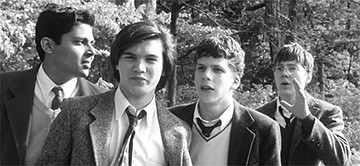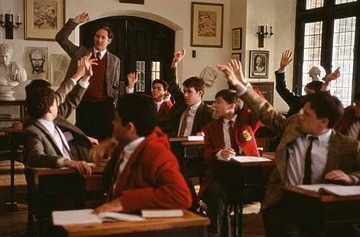
Kline’s Emperor might need new story line
The Emperor’s Club is the kind of movie you might expect to find playing on an endless loop at those Disney ‘Teachers of the Year’ award ceremonies.
Teachers may be the only people who will be able to enjoy this movie.
While they are informed enough to see how cliché it is, they’re just likely not to want to.
If teachers can’t make a pro athlete’s salary or be randomly sent on a first-class vacation by Oprah, they at least deserve a quality movie to honor their cause.
But when that movie is The Emperor’s Club, you have to take what you can get.
The film opens with an aged Kevin Kline reflecting on his long career and then focuses on one particularly turbulent year.
Kline gives a rather stiff performance as William Hundert, a teacher of the classics at St. Benedict’s, an elite East Coast boarding school for boys in the early ’70s, and his is but one of many sophisticated sounding names in the cast of characters including Woodbridge, Ellerby and Elizabeth.
St. Benedict’s looks a heck of a lot like young Johnny Nash’s Princeton, minus the imaginary, pizza-loving roommate.
One can already see the obvious similarities to another film, Peter Weir’s Dead Poet’s Society.
Hundert’s students are impressionable and after some early classroom antics, they fall under his spell.
St. Benedict’s has an annual Julius Caesar contest in which the three students with the highest test scores adorn togas and compete Jeopardy-style for the fig leaf crown.
The soft-spoken Martin Blythe, with his red and yellow striped scarf and round spectacles – a little crestfallen from a possibly failed Harry Potter audition, is especially determined to follow in his father’s path and make the cut.
All is well until one day Sedgewick Bell (Emile Hirsch), the senator’s son, comes along. And with him, the spirit of rock ‘n’ roll rebellion.
Characters like Sedgewick are a dime a dozen. They show up unannounced to mix things up. He appeals to his classmates’ restless desire to engage in zany stunts like skinny-dipping with naughty nearby schoolgirls.
Unfortunately for Sedgewick, Hundert’s long arm extends to such substantial extracurricular jurisdictions. It’s only after making a trip to Capital Hill for a meeting with the boy’s father is Hundert able to gain some control of him.
Sedgewick soon makes a dramatic turnaround and before long he is making a race for the Julius Caesar competition.
Wait a second, isn’t Sedgewick supposed to spiral violently out of control and get himself or someone else killed? Aren’t movies like this supposed to end in some snowy funeral?
Apparently director Michael Hoffman is so clueless he can’t bridge the character’s obvious and rather narrow arch.
As Hundert grades the last tests of the semester, he bumps up Sedgewick’s score knocking him into third place dropping Martin Blythe to fourth.
It’s a decision he comes to regret, and as the competition ensues, Hundert discovers that Sedgewick is cheating. But why does he cheat? To win of course, but he doesn’t win – he misses the last question.
Then the film returns to the present. The final act is one that must have been concocted at the eleventh hour of a frantic writers’ meeting.
Hundert gets fired, but is then invited to Sedgewick’s bucolic estate for an unofficial St. Benedict’s reunion and a Julius Caesar rematch.
It seems that little has changed for Sedgewick (now played by Joel Gretch, in a performance that in no way resembles that of Hirsch’s). He does what he has to do to get what he wants in life.
Later that night he announces he’s running for Senate. Needless to say, Hundert feels he’s failed Sedgewick. Well, of course he failed him. Sedgewick still doesn’t know how to cheat right.
Hundert’s other former pupils still idolize him and affectionately call him Mr. H, but these actors, Robert Culp and Patrick Dempsey among them, look more like Dockers models.
If the people who made this movie knew anything about its subject, they would know graduates of schools like St. Benedict’s don’t become CEOs and captains of industry – they become writers, historians, and even politicians and teachers.
Kevin Kline’s last decent role was in the 2001 film Anniversary Party, directed by two actors, Alan Cumming and Jennifer Jason Leigh. He played an aging leading man who laments his graying hair is diminishing his choice of film roles, forcing him to make bad movies.
Kline likely didn’t have to look far for inspiration.

Kline’s Emperor might need new story line








